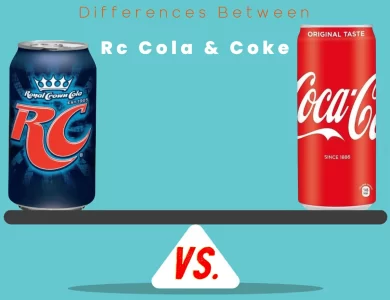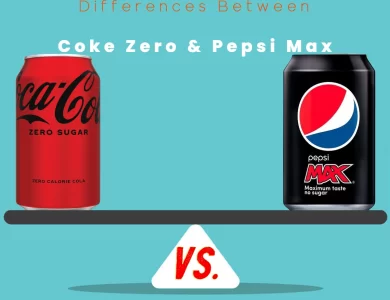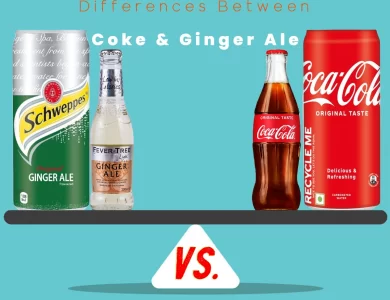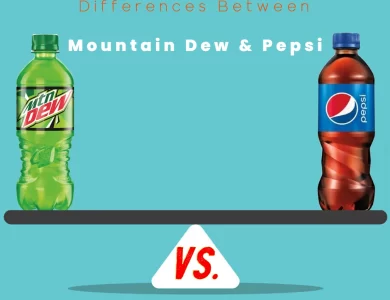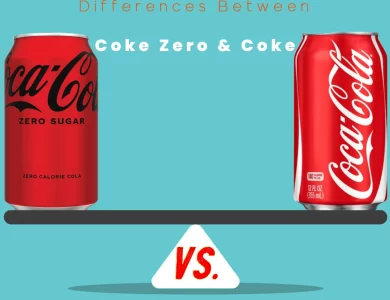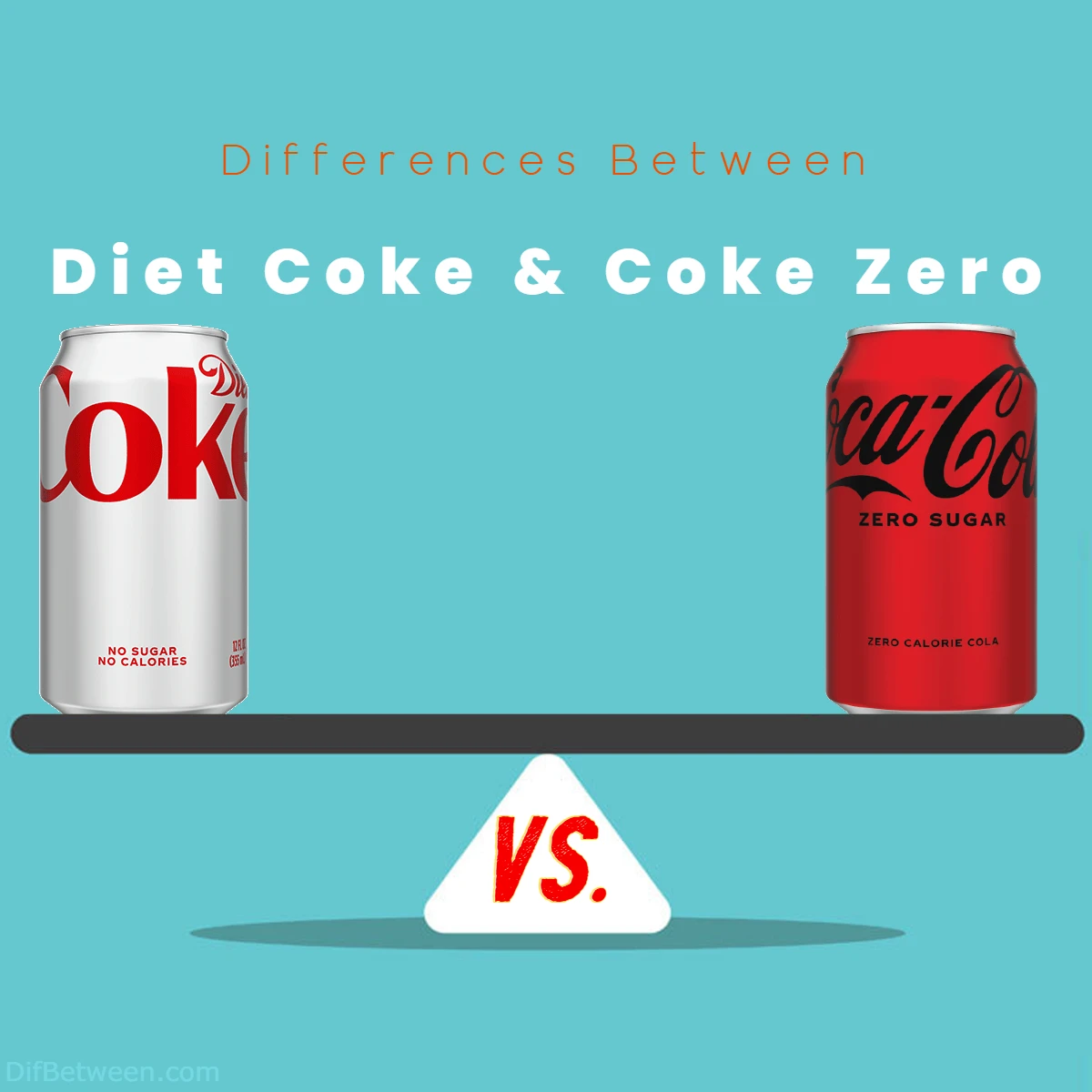
| Feature | Diet Coke | Coke Zero |
|---|---|---|
| Sweeteners | Aspartame | Aspartame, Acesulfame Potassium (Ace-K) |
| Flavor Profile | Unique, slightly citrusy with caramel undertones | Emulates classic Coca-Cola taste |
| Caffeine Content | 46 mg per 12 fl oz (355 mL) | 34 mg per 12 fl oz (355 mL) |
| Calories | 0 | 0 |
| Total Fat | 0g | 0g |
| Saturated Fat | 0g | 0g |
| Trans Fat | 0g | 0g |
| Cholesterol | 0mg | 0mg |
| Sodium | 40mg | 40mg |
| Total Carbohydrates | 0g | 0g |
| Dietary Fiber | 0g | 0g |
| Sugars | 0g | 0g |
| Protein | 0g | 0g |
| Varieties and Flavors | Wide range of flavor variations available | Focused on preserving classic Coca-Cola taste |
| Packaging | Collectible and stylish packaging options | Standard packaging options |
| Target Audience | Appeals to health-conscious individuals | Attracts those seeking a sugar-free Coca-Cola taste |
| Market Positioning | Positioned as more than just a beverage choice | Emphasizes a sugar-free alternative to Coca-Cola |
| Global Availability | Available in numerous countries worldwide | Widely distributed in various regions |
If you’re on a quest to quench your thirst without the guilt of added sugars, these two bubbly beverages have undoubtedly caught your attention. But fear not, for we’re here to guide you through the sparkling world of Diet Coke and Coke Zero, helping you make an informed choice for your taste buds and lifestyle. So, kick back, pop open a can, and let’s dive into the sweet science behind these carbonated wonders.
Differences Between Diet Coke and Coke Zero
The History Behind Diet Coke and Coke Zero
Diet Coke: The story of Diet Coke begins in the early 1980s, as the Coca-Cola Company noticed a growing demand for sugar-free alternatives to their flagship product, Coca-Cola. After several years of development and market research, Diet Coke made its grand debut in 1982, becoming the first-ever sugar-free carbonated beverage under the Coca-Cola brand. Its introduction marked a significant milestone for the company, as it sought to cater to consumers’ evolving preferences for healthier and lower-calorie options.
Diet Coke’s initial success was astounding, and it quickly gained a dedicated fan base. Its crisp, refreshing flavor and calorie-free formula appealed to health-conscious individuals looking to enjoy a fizzy beverage without worrying about excess calories or sugars. Over the years, Diet Coke has continued to evolve, introducing various flavor variations and stylish packaging options, further solidifying its status as an iconic and enduring sugar-free soda.
Coke Zero: Coke Zero entered the stage in 2005, nearly two decades after the debut of Diet Coke. The inspiration behind Coke Zero came from consumer feedback, which indicated that while Diet Coke was beloved by many, some consumers desired a zero-calorie option that replicated the taste of classic Coca-Cola more faithfully.
With this valuable insight in hand, the Coca-Cola Company embarked on a new journey, creating Coke Zero. The beverage was formulated to deliver a taste experience that closely mimicked the flavor of original Coca-Cola, thanks to the clever combination of aspartame and acesulfame potassium. Coke Zero’s introduction was a resounding success, especially among Coca-Cola loyalists who craved the classic Coke taste without the sugar content.
Over time, Coke Zero has become an integral part of the Coca-Cola portfolio, standing shoulder-to-shoulder with Diet Coke, providing consumers with a range of sugar-free options to suit their diverse tastes and preferences.
The Sweetness Factor
Diet Coke: When it comes to sweetness, Diet Coke takes the crown. It is sweetened primarily with aspartame, an artificial sweetener that packs a potent punch without adding any calories. Aspartame has been approved by various health organizations worldwide, including the US Food and Drug Administration (FDA) and the European Food Safety Authority (EFSA). The result is a satisfyingly sweet taste without the guilt of consuming sugar.
Coke Zero: Coke Zero, on the other hand, boasts a slightly different approach to sweetness. It utilizes a combination of two artificial sweeteners: aspartame and acesulfame potassium (Ace-K). This blend creates a balanced, yet not overpowering, level of sweetness that appeals to a broad range of taste preferences.
In summary, if you prefer a sweeter experience akin to traditional Coca-Cola, Diet Coke with its aspartame formulation might be your go-to option. However, if you seek a milder sweetness profile, Coke Zero’s aspartame and Ace-K combination could be the perfect fit.
Flavor Profile
Diet Coke: Ah, the distinctive flavor of Diet Coke! Its unique taste has garnered a devoted fan base worldwide. The precise combination of flavors in Diet Coke gives it a crisp, slightly citrusy note with a subtle blend of caramel undertones. This creates a flavor profile that stands on its own and sets it apart from the classic Coca-Cola taste.
Coke Zero: Coke Zero, as you may have guessed, strives to emulate the beloved flavor of regular Coca-Cola as closely as possible. It’s designed to be a sugar-free alternative that captures that classic Coke taste we all know and love. Many Coke aficionados appreciate the similarity, as Coke Zero delivers a remarkably similar flavor without the added sugar.
If you’re a fan of Diet Coke’s unique and refreshing taste, you’ll likely enjoy the crisp and original flavor it offers. Conversely, if you can’t resist the classic Coca-Cola taste but want to cut down on sugar intake, Coke Zero might be your perfect beverage match.
The Caffeine Content
Diet Coke: Need a pick-me-up to get through the day? Diet Coke has your back! It contains caffeine, just like its sugary sibling Coca-Cola. Caffeine content can vary slightly depending on the country or region, but generally, a 12 fl oz (355 mL) serving of Diet Coke contains around 46 mg of caffeine.
Coke Zero: Feeling a bit low on energy? Coke Zero has a solution! Like Diet Coke, it also contains caffeine. The caffeine content in Coke Zero is comparable to Diet Coke, typically Coke Zero contains 34 mg per 12 fl oz (355 mL) serving.
Let’s face it; both Diet Coke and Coke Zero can give you that much-needed caffeine boost when you’re running on empty. So, whether you’re working late or need a morning kickstart, these beverages have got you covered!
To help you visualize the differences between Diet Coke and Coke Zero, here’s a handy comparison table:
| Feature | Diet Coke | Coke Zero |
|---|---|---|
| Sweeteners | Aspartame | Aspartame, Ace-K |
| Flavor Profile | Unique, slightly citrusy | Emulates classic Coke taste |
| Caffeine Content | Approximately 46 mg/12 fl oz | Approximately 34 mg/12 fl oz |
Packaging and Varieties
Diet Coke: Diet Coke has been a trailblazer in offering an array of exciting packaging options, making it a favorite among collectors and fashion enthusiasts alike. Over the years, it has collaborated with various designers and artists, creating limited-edition cans and bottles that reflect the latest trends and pop culture. These collectible editions have become highly sought-after items, bringing a touch of uniqueness to the Diet Coke experience.
In terms of varieties, Diet Coke boasts a diverse lineup of flavors to tantalize your taste buds. While the classic Diet Coke remains a staple, you’ll find a wide selection of options, including Diet Coke with Lime, Diet Coke with Cherry, Diet Coke with Ginger Lime, and more! This wide assortment ensures there’s a Diet Coke variant for every palate.
Coke Zero: Although Coke Zero may not have delved into the world of designer collaborations to the same extent as Diet Coke, it still offers variety and versatility. Coke Zero typically comes in a few different sizes, from individual cans to large bottles, catering to various preferences and occasions.
When it comes to flavors, Coke Zero aims to maintain its focus on delivering the classic Coca-Cola taste. You might find regional variations or limited-edition releases, but overall, Coke Zero remains committed to preserving the core flavor experience.
Target Audience and Market Positioning
Diet Coke: Diet Coke has a strong appeal among health-conscious individuals, fitness enthusiasts, and those actively watching their caloric intake. The use of aspartame as the primary sweetener, which contains no calories, aligns perfectly with the preferences of consumers seeking a low-calorie or zero-calorie soda option. Additionally, the various flavor options cater to different tastes, further expanding Diet Coke’s appeal.
Moreover, Diet Coke has cultivated a devoted fan base over the years, thanks in part to its vibrant marketing campaigns and associations with fashion, art, and popular culture. This positioning has allowed Diet Coke to establish itself as more than just a beverage choice; it’s a lifestyle statement.
Coke Zero: Coke Zero, too, targets health-conscious consumers, particularly those who desire a sugar-free alternative to regular Coca-Cola without compromising on taste. By replicating the classic Coke flavor, Coke Zero positions itself as a seamless transition for fans of the original Coca-Cola seeking a healthier option.
While Coke Zero may not have the same extensive range of flavors as Diet Coke, its simplicity and dedication to delivering a familiar taste resonate with a broad consumer base. This appeal to simplicity and nostalgia has allowed Coke Zero to carve out its own distinct space in the sugar-free beverage market.
Nutritional Differences
Now, let’s dive deeper into the nutritional aspect of these two popular sodas. The table below highlights the nutritional differences between Diet Coke and Coke Zero based on a standard 12 fl oz (355 mL) serving:
| Nutrient | Diet Coke | Coke Zero |
|---|---|---|
| Calories | 0 | 0 |
| Total Fat | 0g | 0g |
| Saturated Fat | 0g | 0g |
| Trans Fat | 0g | 0g |
| Cholesterol | 0mg | 0mg |
| Sodium | 40mg | 40mg |
| Total Carbohydrates | 0g | 0g |
| Dietary Fiber | 0g | 0g |
| Sugars | 0g | 0g |
| Protein | 0g | 0g |
As you can see, both Diet Coke and Coke Zero provide a calorie-free and sugar-free beverage option, making them suitable choices for those watching their weight or managing their sugar intake. The absence of carbohydrates and sugars ensures these drinks won’t spike your blood sugar levels, making them particularly appealing to individuals with diabetes or those following a low-carb diet.
Consumer Preferences and Global Availability
Diet Coke: Diet Coke has been a longtime favorite since its introduction in 1982. Over the years, it has earned its spot as one of the best-selling diet sodas worldwide, with a considerable presence in the United States, Europe, Asia, and beyond. The brand’s strong marketing and innovation efforts have allowed Diet Coke to maintain its relevance and popularity among consumers of all ages.
With its diverse range of flavors and eye-catching packaging, Diet Coke continues to attract new fans and retain its loyal following. Whether you’re at a social gathering, dining out, or simply craving a fizzy treat at home, chances are you won’t have trouble finding Diet Coke on the menu or at your nearest store.
Coke Zero: Coke Zero, introduced in 2005, has also enjoyed widespread success in the global market. It has particularly appealed to consumers who are loyal to the Coca-Cola brand but wish to reduce their sugar consumption. Over the years, Coke Zero has gained popularity in various regions, including North America, Europe, Latin America, and Asia.
Much like Diet Coke, Coke Zero is readily available in most stores and restaurants, making it a convenient choice for individuals seeking a sugar-free cola experience. Its strong association with the Coca-Cola brand name has played a crucial role in driving its market presence and acceptance among consumers.
Diet Coke or Coke Zero: Which One Should You Choose?
When it comes to choosing between Diet Coke and Coke Zero, the decision ultimately depends on your personal taste preferences and health goals. Let’s recap the key differences between the two sugar-free sodas to help you make an informed choice:
Choose Diet Coke if:
- You prefer a sweeter taste: Diet Coke, sweetened primarily with aspartame, offers a sweeter flavor profile compared to Coke Zero, which combines aspartame and Ace-K. If you enjoy a more pronounced sweetness akin to traditional Coca-Cola, Diet Coke might be the better option for you.
- You appreciate unique flavors: Diet Coke boasts a distinctive flavor with hints of citrus and caramel undertones. If you’re looking for a soda that stands out from the classic cola taste, Diet Coke’s unique flavor might be right up your alley.
- You enjoy variety in flavors and packaging: Diet Coke has a wide range of flavor variations, from Diet Coke with Lime to Diet Coke with Cherry and beyond. Additionally, its limited-edition packaging collaborations with designers and artists make it a sought-after collectible for enthusiasts.
Choose Coke Zero if:
- You want a taste closer to regular Coca-Cola: Coke Zero’s formulation is designed to emulate the classic Coca-Cola taste, thanks to the combination of aspartame and Ace-K. If you’re a fan of original Coca-Cola but seek a sugar-free option, Coke Zero is an excellent choice.
- You prefer a milder sweetness: Some individuals find Coke Zero’s combination of sweeteners creates a more balanced and less intense sweetness compared to Diet Coke’s aspartame formulation.
- You appreciate simplicity: While Coke Zero may not have the extensive flavor variety of Diet Coke, its dedication to delivering the classic Coca-Cola taste in a sugar-free format appeals to those who value familiarity and nostalgia.
Considerations for Both:
- Health and Nutrition: Both Diet Coke and Coke Zero are calorie-free and sugar-free, making them suitable options for individuals watching their weight or managing sugar intake. However, some concerns have been raised about the long-term effects of artificial sweeteners, so moderation is key.
- Caffeine Content: Both sodas contain caffeine, offering a mild pick-me-up. If you’re sensitive to caffeine or trying to minimize your intake, consider this aspect when making your choice.
- Environmental Impact: As with any beverage, be mindful of the environmental impact of single-use packaging. Opt for recycling or choosing brands committed to sustainable packaging solutions.
In the end, the choice between Diet Coke and Coke Zero boils down to your taste preferences, flavor preferences, and lifestyle considerations. Whichever you choose, remember that both sodas provide a sugar-free alternative to traditional Coca-Cola, allowing you to enjoy a fizzy and refreshing drink without the guilt of added sugars. As with any beverage, moderation is key to maintaining a balanced and healthy diet. So, go ahead, make your selection, and enjoy your guilt-free, sugar-free soda experience! Cheers!
FAQs
Diet Coke is sweetened primarily with aspartame, while Coke Zero uses a combination of aspartame and acesulfame potassium (Ace-K).
Diet Coke offers a unique and slightly citrusy taste with hints of caramel undertones. In contrast, Coke Zero aims to emulate the classic Coca-Cola flavor for those who enjoy the traditional cola taste.
Yes, both Diet Coke approximately 46 mg of caffeine per 12 fl oz (355 mL), but Coke Zero contain 34 mg of caffeine per 12 fl oz (355 mL) serving.
Neither Diet Coke nor Coke Zero contains any calories, making them ideal choices for those watching their caloric intake.
Yes, Diet Coke offers a wide range of flavor variations, such as Diet Coke with Lime and Diet Coke with Cherry, along with collectible and stylish packaging options. Coke Zero, however, focuses on preserving the classic Coca-Cola taste and typically offers standard packaging.
Diet Coke appeals to health-conscious individuals looking for a sweeter taste and unique flavors. On the other hand, Coke Zero targets those seeking a sugar-free alternative with a taste closer to regular Coca-Cola.
Diet Coke is positioned as more than just a beverage choice, often associated with fashion, art, and popular culture. Coke Zero emphasizes being a sugar-free alternative to traditional Coca-Cola, attracting fans of the classic taste.
Yes, both Diet Coke and Coke Zero are widely available in numerous countries worldwide.
The choice depends on your taste preferences. If you prefer a sweeter and unique taste, opt for Diet Coke. If you desire a flavor closer to regular Coca-Cola, go for Coke Zero. Both offer a guilt-free and refreshing experience for soda lovers.
Yes, both Diet Coke and Coke Zero provide sugar-free options, making them healthier alternatives for individuals looking to reduce sugar and calorie intake. However, it’s essential to consume all sodas in moderation as part of a balanced diet.
Read More:
Contents
